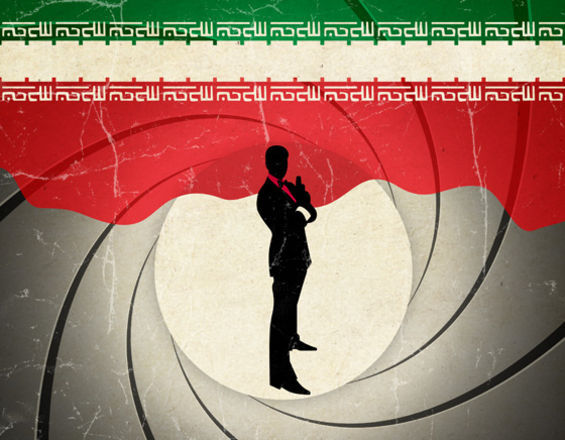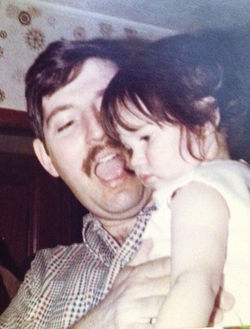The Spy Bob Levinson Vanished in Iran

Inside the Colonial-style monolith that houses Beggs & Lane, Pensacola's oldest law firm, sits Sonya Dobbs, a thin-lipped paralegal from Birmingham, Alabama, with a button nose and long black hair. The perfectly coifed, 52-year-old mother of three pastes user name after user name and password after password into an array of email sites.
She tries Yahoo! and Hotmail. Maybe, she thinks, the client is still using AOL. But nope. Then she pulls up Gmail and mindlessly plugs in the info. She hits enter, expecting the same "incorrect password" warning she's been looking at all afternoon, but then the screen loads. She tries to call out to her boss, a redwood tree of a man named David McGee, but can't raise her voice above a whisper. Instead, she just keeps uttering the most expressive phrase her genteel mind can generate: Holy crap.
McGee strolls out of his office. Although he manages to remain calm, they both know what's at stake. The emails they're looking at belong to Robert Levinson, an internationally infamous private detective and longtime friend of McGee's from Coral Springs who had vanished the month before after taking a clandestine trip to Iran.


Details
Related Stories
 Congressman Asks FBI to Investigate USA Swimming Over Child Sex Abuse October 23, 2014
Congressman Asks FBI to Investigate USA Swimming Over Child Sex Abuse October 23, 2014 From Famous Paintings to Egyptian Sarcophagi, South Florida Is a Hub for Illicit ArtifactsSeptember 11, 2014
From Famous Paintings to Egyptian Sarcophagi, South Florida Is a Hub for Illicit ArtifactsSeptember 11, 2014 Fourteen Years in Jail for Using a Laser Pointer? Cops, FBI Are Cracking Down in FloridaJune 19, 2014
Fourteen Years in Jail for Using a Laser Pointer? Cops, FBI Are Cracking Down in FloridaJune 19, 2014 Miami Dolphins Hire Ex-FBI Agent to Oversee Locker-Room SecurityApril 22, 2014
Miami Dolphins Hire Ex-FBI Agent to Oversee Locker-Room SecurityApril 22, 2014 Robert Levinson, Broward Man Who Disappeared in 2007, Was Part of Unapproved CIA Mission, Report SaysDecember 13, 2013
Robert Levinson, Broward Man Who Disappeared in 2007, Was Part of Unapproved CIA Mission, Report SaysDecember 13, 2013
More About
"Bingo," McGee says with a sigh.
But even in their wildest fantasies, the 57-year-old lawyer and his paralegal couldn't have imagined that their low-tech investigation would trigger an international spy drama the likes of which John le Carré couldn't have dreamed up. Mysterious men in trench coats would stalk their office, secret Senate hearings would convene, and a desperate family in South Florida would grasp for the latest developments.
In the end, the truth came out: America's top spooks lied about Levinson for years, and major parts of the media, including the New York Times, had played along.
The strange saga of Bob Levinson is unprecedented in U.S. covert operations history. After Dobbs and McGee finally proved that parts of the U.S. government sanctioned Levinson's undercover mission in enemy territory, two Associated Press reporters broke a government chokehold to finally tell the truth to the world. There had been covert pleas relayed by shady arms dealers, Hezbollah members, and Russian oligarchs. Even the president had intervened. It all led to the firing of four CIA officials.
But now, four months after the scandal made international headlines, important questions remain unanswered. Levinson's family still believes he's alive, despite the fact that he's overweight and diabetic and was last reported in captivity. Dobbs and her boss believe some parts of the story are yet to be reviewed by the feds. And the central mystery lingers: Why would a 59-year-old man with a happy family and plenty of money take such an insane risk by traveling to Iran with no backup?
Interviews with key players, family, and friends cast new light on one of the strangest stories in South Florida history. They suggest Levinson's motives for flying to Iran were more complex than the systemic CIA mismanagement that's dominated the coverage of his case. Although it's true that internecine government squabbling and a shadowy CIA handler had a part in Levinson's disappearance, the fact remains that his unbending personality also played a key role.
The father of seven suffered something of a midlife crisis that — along with the urgings of an investigative journalist and longtime pal — brought him into the lethal playground of Iran. Although last month marked the seventh anniversary of Levinson's disappearance, few are paying much attention to the calls from his family and friends to keep looking for the long-lost agent. That's especially mystifying to Dobbs and McGee, who were so sure that morning when they discovered the emails that they'd found the evidence to compel the government to take action.
"We thought we'd blow the bugle and the cavalry would come," McGee says. "But it never did."
According to family lore, Bobby Levinson began his career path when he was 7 years old. His architect dad and homemaker mom drove him to a nearby FBI field office so he could apply for a job. Impressed by the gesture, the employees there made him a special badge and gave him the made-up title of "junior agent." He vowed to come back when he was old enough.
Although most kids go through a phase in which they want to be astronauts, firefighters, or secret spies, Levinson developed a lifelong fascination with public service and adventure. He would become a dedicated agent — a workaholic, some say — whose ambition and passion would drive him to notable successes and occasional problems in the bureau. In the end, the same instincts that made him a successful agent led to his disappearance.
Levinson grew up in Long Island and attended Herricks High School in New Hyde Park, a whitewashed neighborhood that seemed to have missed the hippie movement. There, he was a regular student — a member of the Sea Explorers, the Ham Radio Club, and the Judo Team. Friends remember a quiet, well-liked, 17-year-old beanpole who made for a formidable wrestling opponent at six-foot-four. He managed to float between the jocks and the nerds without getting close to people in either group — a nonpolitical guy who was friendly with everyone and who defied stereotype.
Now Trending
Around The Web
-
 Benjamin Lawsky
Village Voice
Benjamin Lawsky
Village Voice
-
 OC Juries Prep Another Dirty Cop Blowjob?
OC Weekly
OC Juries Prep Another Dirty Cop Blowjob?
OC Weekly
-
 Six months later, police records reveal new details.
Miami New Times
Six months later, police records reveal new details.
Miami New Times
New Times on Facebook
-
My Account
Log In
Join -
Connect
Facebook
Twitter
Newsletters
Things To Do App -
Advertising
Contact Us
National
Agency Services
Classified
Infographics
-
Company
Privacy Policy
Terms of Use
Site Problems?
Careers









































